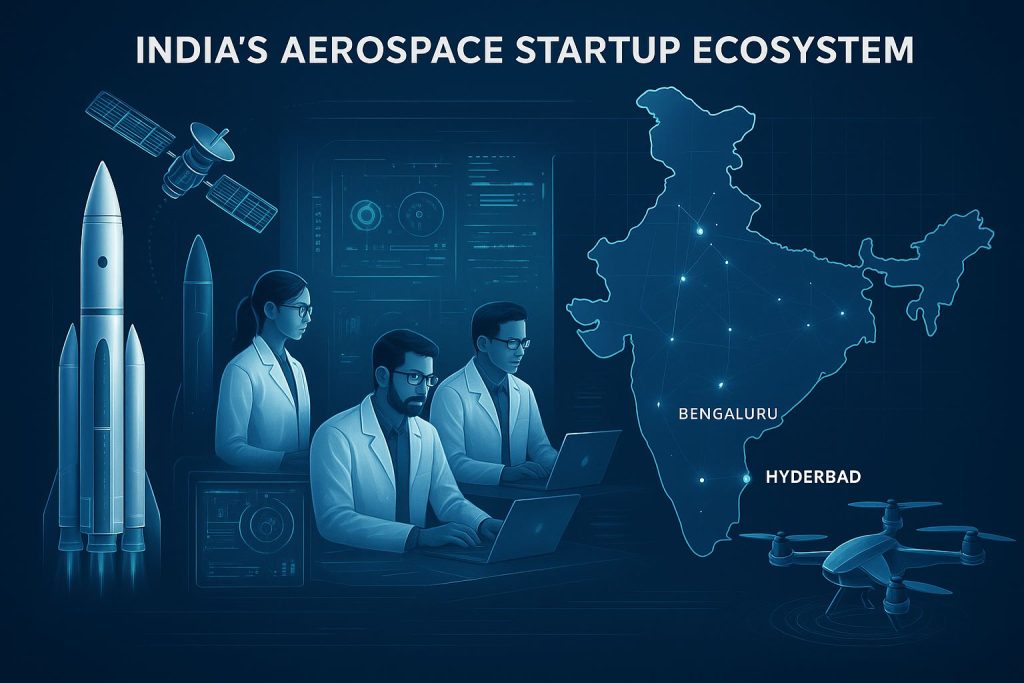India’s aerospace sector is undergoing a transformative phase, driven by a surge of innovation from startups that are redefining the landscape of aviation and space exploration. These emerging companies are not only contributing to technological advancements but are also positioning India as a formidable player in the global aerospace arena.
The Rise of Aerospace Startups in India
The liberalization of India’s space policies and the establishment of supportive frameworks have paved the way for a burgeoning aerospace startup ecosystem. With over 300 space startups operational by mid-2025, India is witnessing a democratization of space technology, enabling private entities to engage in satellite development, launch vehicle manufacturing, and advanced aerospace research. Wikipedia

The government’s proactive approach, including the approval of a ₹1,000 crore ($119 million) fund for space startups, underscores its commitment to fostering innovation and self-reliance in the aerospace sector.
Key Aerospace Startups Shaping India’s Future
1. Pixxel
Founded in 2019, Pixxel is at the forefront of hyperspectral imaging technology. The company is developing a constellation of satellites capable of capturing high-resolution images that reveal the chemical and physical compositions of Earth’s surface. These capabilities have significant applications in agriculture, mining, and environmental monitoring. With successful launches of their demo satellites, Pixxel is poised to revolutionize Earth observation.
2. Agnikul Cosmos
Established in 2017, Agnikul Cosmos is pioneering the development of small satellite launch vehicles. Their flagship rocket, Agnibaan, is notable for its 3D-printed engine, Agnilet, which is a single-piece design without any welded joints. This innovation not only reduces manufacturing complexity but also enhances performance. Agnikul’s establishment of India’s first private launchpad at Sriharikota marks a significant milestone in the nation’s space capabilities.
3. Skyroot Aerospace
Skyroot Aerospace made history in November 2022 by launching Vikram-S, India’s first privately developed rocket. Founded in 2018, Skyroot is developing a series of rockets designed to provide cost-effective and flexible access to space for small satellite operators. Their use of carbon composite structures and 3D-printed components exemplifies their commitment to innovation in aerospace technology.
4. Bellatrix Aerospace
Bellatrix Aerospace is focused on developing in-space propulsion systems and satellite platforms. Their work on electric propulsion technologies aims to enhance the efficiency and longevity of satellites. Bellatrix’s collaboration with international entities, such as Astroscale, highlights the global recognition of India’s capabilities in space technology.
5. LAT Aerospace
Founded in 2025, LAT Aerospace is revolutionizing regional air travel in India. The company is developing hybrid-electric, short take-off and landing (STOL) aircraft designed to connect Tier-2 and Tier-3 cities. With backing from notable investors, LAT Aerospace aims to make air travel more accessible and affordable for underserved regions.
Government Initiatives Supporting Aerospace Startups
The Indian government’s support for aerospace startups is evident through various initiatives:
- Financial Support: The establishment of a ₹1,000 crore fund managed by the Indian National Space Promotion and Authorization Center (IN-SPACe) aims to provide financial assistance to startups, enhancing their research and development capabilities.
- Infrastructure Development: Collaborations with global aerospace companies, such as the partnership between Tata Advanced Systems Limited and Airbus to set up India’s first private helicopter assembly line, demonstrate the government’s commitment to developing world-class aerospace infrastructure.
- Policy Reforms: Liberalization of space policies has facilitated private sector participation in satellite launches and space missions, fostering a competitive and innovative environment.
Challenges and Opportunities
While the aerospace startup ecosystem in India is thriving, several challenges persist:
- Regulatory Hurdles: Navigating the complex regulatory landscape can be time-consuming and may delay project timelines.
- Funding Constraints: Securing adequate funding remains a challenge for many startups, despite government initiatives.
- Talent Acquisition: Attracting and retaining skilled professionals in specialized fields like aerospace engineering is crucial for sustaining innovation.
Despite these challenges, the opportunities are vast:
- Global Market Access: India’s growing reputation in aerospace technology opens avenues for international collaborations and market expansion.
- Technological Advancements: Continued investment in research and development can lead to breakthroughs in propulsion systems, satellite technology, and aerospace manufacturing.
- Infrastructure Growth: Development of aerospace hubs and facilities will bolster the industry’s growth and attract further investments.
Also Visit- Biotech startup Expo
Conclusion
India’s aerospace startups are at the cusp of a new era, characterized by innovation, collaboration, and global recognition. With continued support from the government and the private sector, these startups are poised to make significant contributions to the fields of aviation and space exploration. As they navigate challenges and seize opportunities, India’s position in the global aerospace landscape is set to strengthen, paving the way for a future where space and air travel are more accessible and efficient for all.

